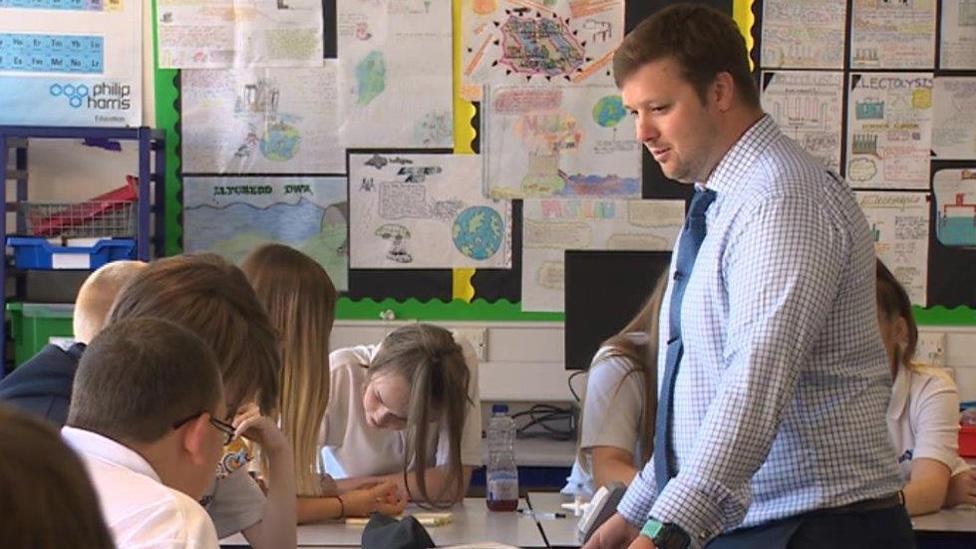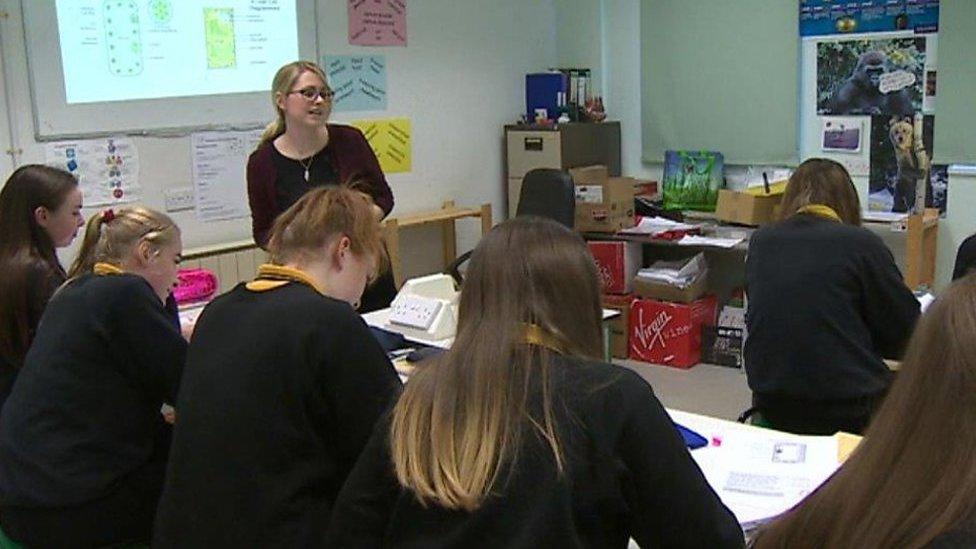Online and part-time teacher training to 'remove barriers'
- Published
Aled Mason said teachers in some subjects like science were 'like gold dust'
A new part-time course to train teachers is being offered - with many of the classes available online.
The aim is to make it easier for people thinking about a change in career or not living within easy reach of university.
It is hoped it will attract more people like Aled Mason, a pharmacist turned science teacher in Swansea.
He believes more flexibility and "on the job" opportunities might encourage more like him to switch into teaching.

"I'd worked with children in a life saving club and teaching surfing when I was younger, in the summer, and always enjoyed it," he said.
"Nothing is ever boring with children. I thought I'd go for it and I looked at different pathways into teaching - and I decided on a graduate training programme as the way forward, which was learning on the job.
"The big difference was the money available while teaching. I'd just increased my mortgage and so that needed to be paid and doing it that way I was able to pay for that back home."
His first year was financially tough after working as a locum pharmacist.
Mr Mason took an initial £25,000 pay cut when he left pharmacy after eight years and friends "thought I was nuts".
But he finds teaching more rewarding than his old job.
Mr Mason, 32, is now a chemistry teacher at Ysgol Gyfun Gymraeg Bryn Tawe and will become head of department in September.
He believes the new part-time course will make the path into teaching easier.
"It will help people who have thought about training in the past, with easier routes into the job and the pay to go with that - I think I would have made the decision a few years back if we'd had these routes available."
The announcement follows concerns about teacher shortages - with the gap between the number of trainees and the target required by secondary schools peaking at more than 300 in the last year.
A snapshot of the position in June shows the gap has grown further - and currently stands at 359.
The Welsh Government wants to ensure potential teachers have a flexibility about how they qualify.
Education Secretary Kirsty Williams said: "New students who may previously never have considered a career in teaching or been put off by costs or their location will have access to an academic qualification and programme that is of the very highest standard while also being flexible and easily accessible."
The students, from 2019-20, will be attached to a university or partnership of colleges.
But they will be able to interact with lecturers and fellow students online, reducing the need to travel to classes.
Ms Williams said an emphasis on online study would "remove any barriers" caused by where people live.
"It's by harnessing technology in this way that we'll attract highly-talented, experienced people with the higher level skills needed by both the teaching profession and our wider economy," she added.
Meanwhile, student teachers will also be able to be employed by schools from the outset - while they work towards their teaching qualification.
This is designed to address teaching shortages in schools, region by region.
Students studying for the part-time Postgraduate Certificate in Education (PGCE) will also have access to maintenance support as part of changes to student finance.
An announcement about which institutions will be able to run the teacher training courses in future is expected soon.
The changes follow a review which highlighted concerns about the quality of teacher training in Wales.
- Published6 January 2018

- Published24 June 2018

- Published14 March 2018
